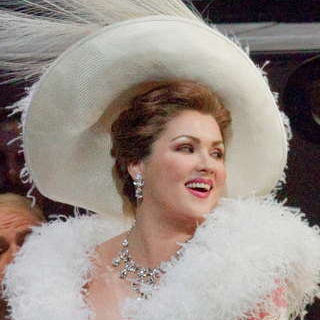ARTICLES BEING VIEWED NOW:
- Régine Crespin
- Hector Berlioz
- Ruth Railton
- Marián Varga
- Profile. A Very Positive Conductor - Paul Bodine talks to Los Angeles Opera's Music Director Designate, Domingo Hindoyan
Euryanthe
'This is not music ...' - Franz Schubert on Euryanthe
Euryanthe is a romantic opera by Carl Maria von Weber. The weak quality of the libretto by Helmine von Chezy, based on an old French story, is generally thought to be the reason why the opera (apart from its overture) is so rarely performed.
In spite of Schubert's comment above, Tovey thought the opera was better, musically, than Wagner's Lohengrin.
The first performance took place on 25 October 1823 at the Kärntnertortheater in Vienna.
The contorted and unbelievable plot is roughly as follows:
Euryanthe is engaged to Count Adolar, and at the palace of King Louis VI, the count sings the her praises. Adolar's friend Lysiart (Count of Forest and Beaujolais) challenges Euryanthe's fidelity and claims he could win her if he tried. Adolar wagers his fortune and estates on Euryanthe's faithfulness and asks Lysiart to prove his claims.
At home in Nevers castle, Euryanthe is harbouring Eglantine de Puiset, daughter of a mutineer. This woman loves Count Adolar and, pretending friendship to Euryanthe, she secretly plans to break Euryanthe's attachment to Adolar.
Lysiart has failed to gain the favours of Euryanthe, and he helps Eglantine. Euryanthe has passed on to Eglantine a secret known only to Adolar and Euryanthe: Adolar's sister lost her lover in battle, and she subsequently committed suicide by drinking poison from a ring. The story goes that sister Emma's soul would never be at peace until tears from an innocent but injured girl fell on the poisoned ring.
Eglantine retrieves the ring from Emma's tomb and gives it to Lysiart, who shows it to Adolar as proof that Euryanthe is unfaithful.
Adolar takes Euryanthe into the desert to kill her, but they are attacked by a serpent, and Euryanthe throws herself between the snake and her lover. Adolar kills the beast, but finds himself no longer able to murder Euryanthe, since she has just put her life at risk to save his. Instead, he leaves her to her fate in the desert.
Euryanthe is discovered by Louis VI and his hunters, and she tells her story to the king. Meanwhile, Eglantine and Lysiart have become engaged and are about to marry in Nevers Castle when Eglantine suddenly imagines seeing Euryanthe's ghost, and tells all. Lysiart kills her, but is immediately apprehended by order of the king, who arrives with Adolar just as Eglantine takes her last breaths. Euryanthe and Adolar, of course, are now able to resume their relationship, and maybe sister Emma also finds her peace.
A selection of articles about Euryanthe
Ensemble. In Honour of Carla Fracci - Giuseppe Pennisi listens to Adolphe Adam's 'Giselle' at Teatro dell'Opera di Roma
CD Spotlight. Music of the Utmost Beauty - Gerald Fenech listens to Weber's 'Euryanthe'. '... highly charged emotional singing, felicitous and lush playing, and the ensemble and choral pieces are brought off with panache and precision.'
Ensemble. A Winning Team - Giuseppe Pennisi listens to a pre-tour concert by Martha Argerich and Antonio Pappano, with the Symphony Orchestra of the Accademia Nazionale di Santa Cecilia
A Real Find - Robert Davies made a remarkable impact when he stood in as Papageno late in the run of English Touring Opera's 'The Magic Flute'; Roderic Dunnett profiles him and celebrates the progress of other ETO cast members
Ensemble. Unalloyed genius - Glyndebourne's recent 'Euryanthe' is fêted by Roderic Dunnett


